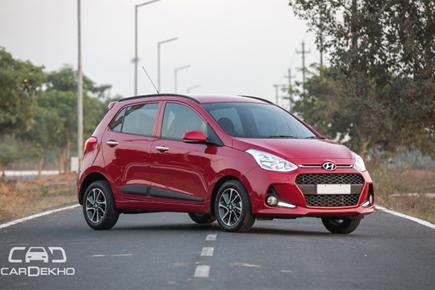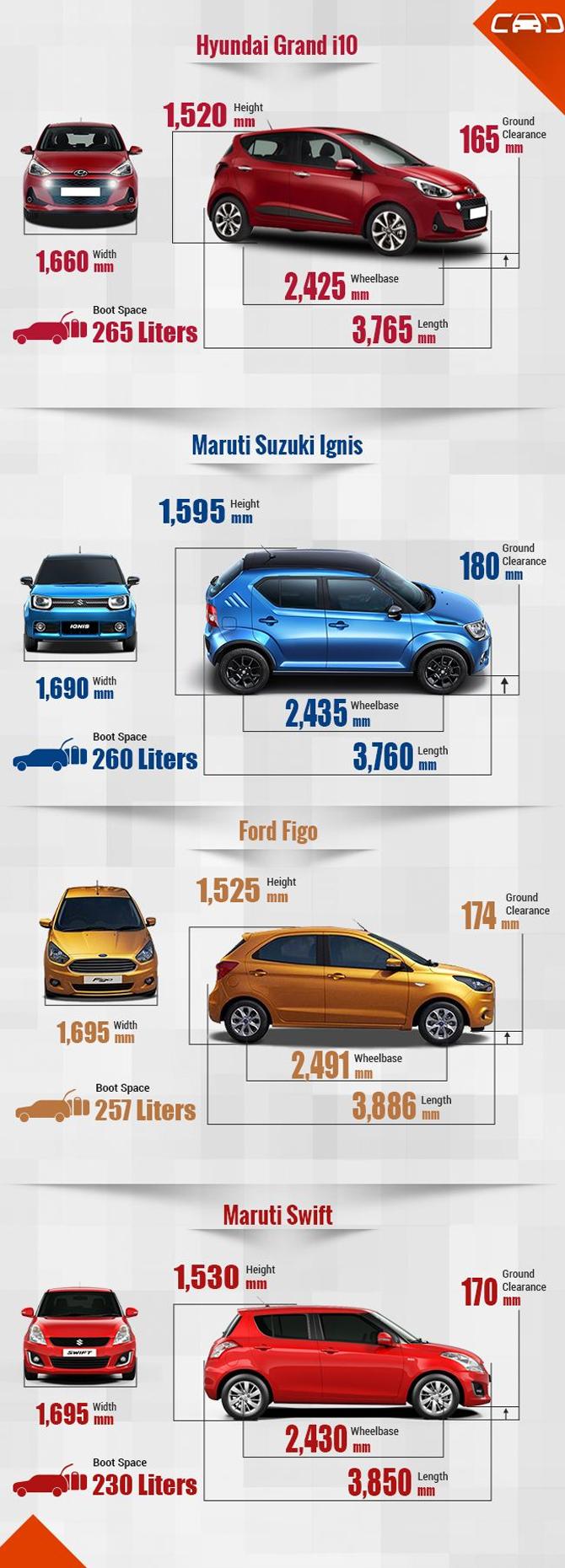Hyundai has introduced the facelifted version of its Grand i10 in the country


ADVERTISEMENT
Hyundai has introduced the facelifted version of its Grand i10 in the country. Incorporating a new heart, the Grand i10’s design is an extension of the fluidic 2.0 philosophy, with its cascading front grille and aerodynamic profile. The Korean hatch was always a good looker and with this update, the charisma has only been more enhanced. As expected from a Hyundai, the car offers premium interiors with an array of comfort and convenience features. The facelift can also be seen as a direct impact of Maruti’s latest kid on the block – the Ignis. With more power under its belt, let’s see how the rivals stack up against the Grand i10 in this specification comparo.

Starting with the dimensions, the Maruti Suzuki Ignis not only looks compact, it’s indeed. With a length of 3760mm, it’s the shortest of the lot, while the Figo is the longest at 3886mm. In the width department, the Figo and the Swift share the top spot with 1695mm. The Figo pips the nearest contender, the Swift, in the wheelbase section by a good margin of 61mm. While the Ignis manages to stay highest above the ground with a clearance of 180mm, it’s the new Grand i10 which is nearest to the turf at 165mm. However, there’s one area where the Hyundai hatch beats everybody – the boot (265-litres).

The petrol engines across the comparison are of 1.2-litre capacity with the exception being the Figo, which has a 1.5-litre as an option. The Hyundai Grand i10 pumps out the least power at 83PS while the Figo 1.2L mill does the max – 88PS whereas its 1.5-litre motor produces 112PS. The torque generated is again similar among the rivals with the Swift marginally getting the best 115Nm. However, the Figo’s bigger pot generates 136Nm of it. While every other car in the comparo gets an automatic gearbox, it’s the Swift that misses out on it. The Ignis tops the chart of the mileage with 20.9kmpl.
The biggest change in the new Grand i10 is the new, larger 1.2-litre diesel motor. However, it still falls short of the displacement compared to its rivals, but manages to match the max output of 75PS. The Ford Figo, with its highest capacity 1.5-litre engine, trumps all by generating 100PS. The Ford hatch is the torquiest of the lot too at 215Nm. Rest of the cars generate 190Nm of torque. All the cars are mated to a 5-speed manual transmission with the exception being the Ignis, which gets a 5-speed AMT option. Well, in the diesel tussle too, it’s the Ignis which beats the competition with 26.8kmpl of fuel economy.
Know how the new diesel engine of the Grand i10 fares
Summing it up, all the cars in the competition feel pumped up on charts and are almost head to head when it comes to their specifications; of course, the Figo stands out with being the most powerful, torquiest and longest vehicle in the comparo. The powerful engine and subtle changes in the looks could help the case of the Hyundai Grand i10, but to how much degree, only the future sales numbers can answer.
Recommended Read:
Hyundai Grand i10 Facelift: Variants Explained
Hyundai Grand i10 Variants vs competition variants
Read More on : Grand i10 india
 Subscribe today by clicking the link and stay updated with the latest news!" Click here!
Subscribe today by clicking the link and stay updated with the latest news!" Click here!






